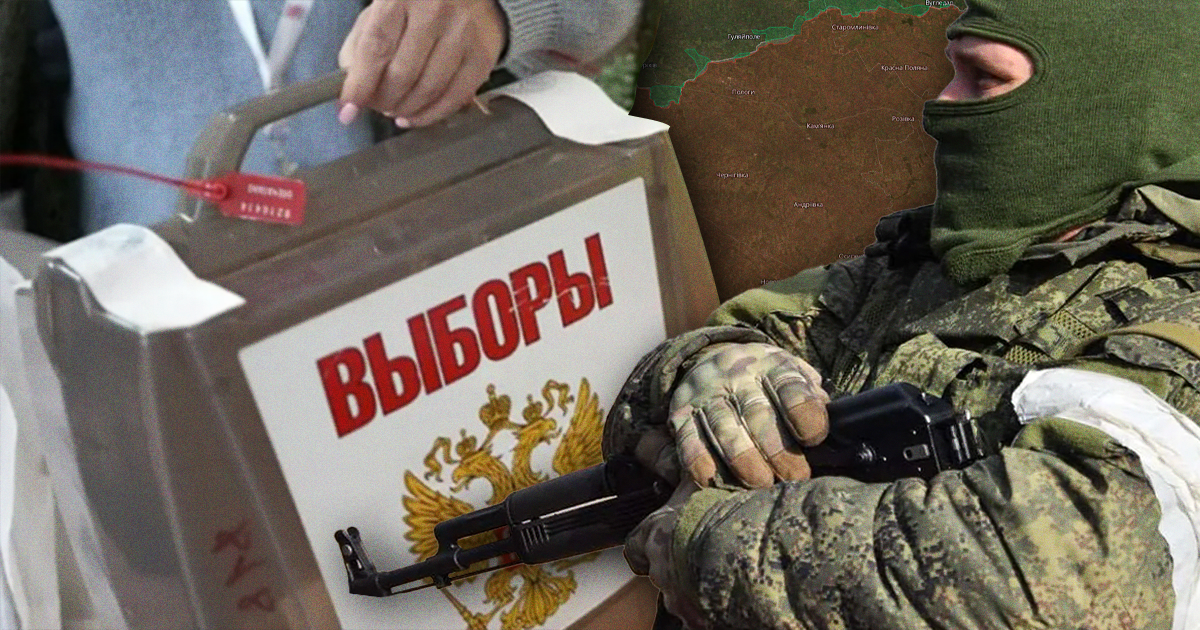On March 15-17, 2024, Russia will hold presidential election, the result of which is a foregone conclusion – Vladimir Putin will certainly achieve a “victory”.
This is the second time that the illegal “elections” have been scheduled in the occupied areas of Donetsk, Luhansk, Zaporizhzhia and Kherson oblasts since the so-called “accession” of these territories to Russia in 2022.
Civil Network OPORA has analyzed the different ways in which Russia is using the “expression of will” to legitimize the occupation, discredit Ukraine and intimidate the residents of the occupied territories.
Russian occupation authorities resort to systematic violation of human rights and the rules of law by way of forcing Ukrainians to participate in “voting” under the threat of reprisals and deportation.
“House-to-house visitation” of the voters with the involvement of armed military personnel is aimed at identifying pro-Ukrainian residents and mobilizing local population into the Russian army.
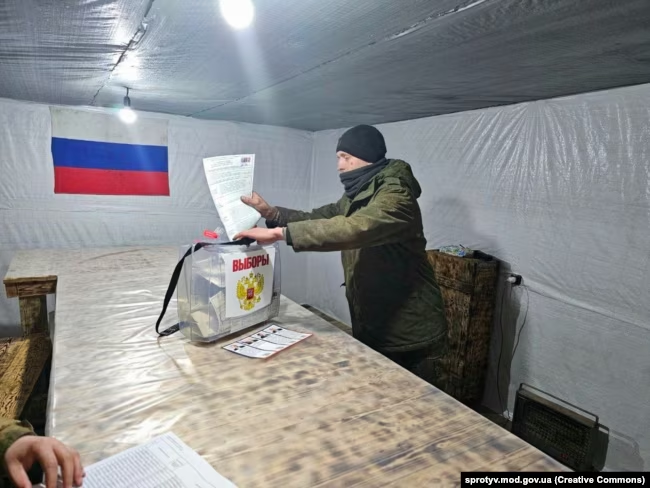
The 2024 election of the president of the Russian Federation in the occupied territories of Ukraine
The fact that international organizations and UN member states recognize the legitimacy of the all-Russian election results, even if they don’t acknowledge the legality of “election” in the occupied territories of Ukraine, goes to show that the international institutions are going through a crisis and have very limited capacity to ensure the diplomatic isolation of the Russian Federation.
Russia’s pre-determined “election” results and the exclusion of so-called “opposition” politicians (such as Boris Nadezhdin) from the electoral process give evidence of the absence of genuine civil society and political processes in Russia, which significantly limits the prospect of cooperation between Ukraine and “anti-Putin forces” such as Navalny’s team.
Finally, Russian propaganda is using the “election process” in the temporarily occupied territories (TOTs) to portray Ukraine as an undemocratic (due to failure to hold elections under martial law) and terrorist state (due to “terrorist attacks” on the Russian polling stations).
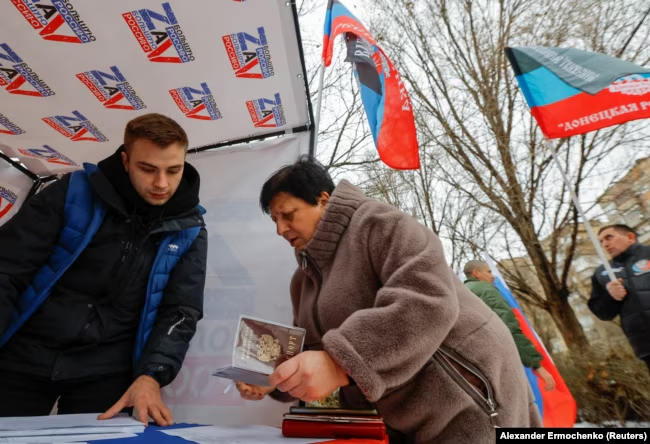
The occupied city of Donetsk. January 2024
“Election” as a tool for legitimizing occupation
Russia has declared martial law in the occupied territories, but this doesn’t stop the occupiers from holding “elections” there. Kremlin propaganda emphasizes that members of “election commissions” will visit every house and every trench to give everyone the opportunity to vote.
Moreover, Russian authorities decided to grant “voting rights” to Ukrainian citizens (residents of the TOTs that refused to accept Russian passports), even if they aren’t registered in the occupied regions, and posted corresponding notices at the polling stations. Russian propaganda justifies this decision by the reason that many Ukrainians living in the TOTs lost their Russian ID documents or didn’t have them re-issued due to a lack of time.
This measure is intended to increase the turnout of voters and thereby prove the “legitimacy” of occupation authorities. Russian media are pushing a narrative that no less than 80% of Russian citizens intend to take part in voting, and more than 90% of Russians plan to do so in the occupied territories.
The so-called “election” results are meant to serve as further evidence of the TOT residents’ “desire” to be part of the Russian Federation and the Russian citizens’ desire to have Putin as the irreplaceable “father of the Russian nation”.
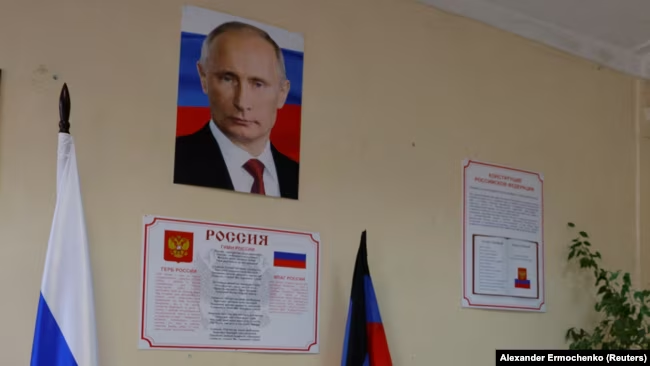
One of the polling stations in the occupied city of Donetsk. 2023
It is noteworthy that the Russian opposition also urges people to go to the polls and cast votes. In the light of Putin’s re-election, Mikhail Khodorkovsky and Leonid Volkov claimed that Russians can voice their protest against the murder of Alexei Navalny by writing his name on the ballot papers.
The logic of actions of the Russian opposition seems a bit strange. Instead of boycotting illegitimate elections, Russian “liberals” provide assistance in retaining power to the authoritarian regime that killed (Alexei Navalny, Anna Politkovskaya, Boris Nemtsov), imprisoned (Ilya Yashin, Vladimir Kara-Murza) and forced hundreds of oppositionists to flee Russia. By doing so, these politicians give the green light to the continuation of armed aggression against Ukraine and harassment of Russians that don’t support the Putin’s regime and have their own opinions.
Boris Nadezhdin, who was banned from participating in presidential “election”, also persuaded Russians from boycotting the election and encouraged them to go to the polls even in the absence of a candidate representing their interests. All of the aforesaid confirms that potential nomination of Nadezhdin is a mere technique used by the Kremlin to legitimize the electoral process.
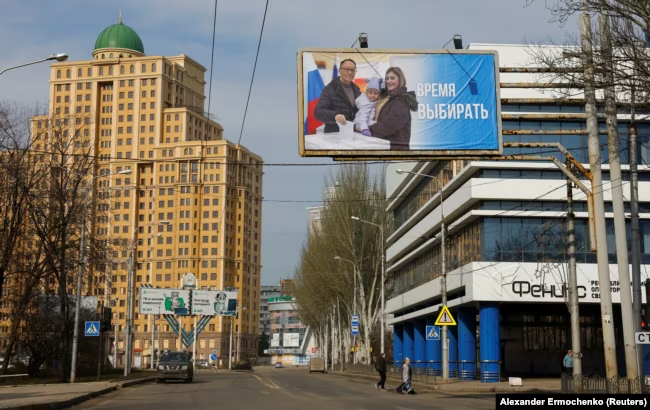
Moscow, Russia. February 14, 2024
Furthermore, Russians are using farcical election to enhance integration of the occupied territories into the Russian Federation. Presidential “election” is scheduled for March 15-17, but in fact the “voting” process has already begun in the TOTs.
Since February 25, courtyard-to-courtyard and house-to-house visitations have been taking place in the occupied parts of Zaporizhzhia and Kherson oblasts to force Ukrainians into voting. This is done by special “visiting commissions” accompanied by armed Russian military.
Apart from being used as a tool for legalizing Russian occupation and putting on a political spectacle called presidential “election”, door-to-door visitation is turning into unofficial “census” of residents of the TOTs (especially in Zaporizhzhia and Kherson oblasts) which serves the purpose of identifying their political views and testing their loyalty.
“Election commissions” and Russian propaganda make no bones about the fact that door-to-door visits are necessary for “readjusting” the residents of the TOTs to new realities of life in the Russian Federation, where the elections and political processes have unique features.
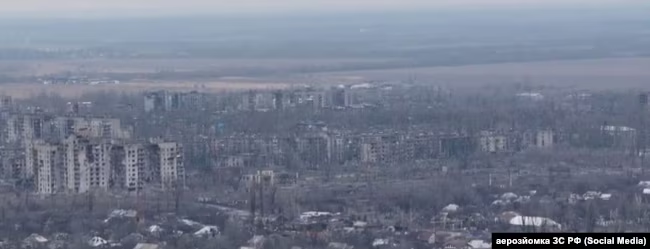
The town of Avdiivka completely destroyed by Russian shelling attacks. February, 2024
It’s hard to imagine a more cynical thing than holding an “election” in the destroyed town of Avdiivka which was captured by Russians in February 2024. Avdiivka was reduced to rubble and almost completely abandoned by local residents. There is almost no functioning infrastructure left in the town, but this didn’t stop the occupation authorities from organizing an “election process” at the premises of “temporary detention centers” (filtration camps) without setting up any polling stations.
The “2024 election” even has its own official slogan: “Together we are strong – we vote for Russia”. This slogan is actively promoted on Russian television, printed campaign materials and billboards throughout the Russian Federation, as well as on the clothes of members of “election commissions” that conduct door-to-door canvassing in the TOTs. This slogan conveys the key message of “election campaign”: Putin and Russia are a single whole.
By doing so, Russian authorities seek to ensure high turnout figures in the farcical election and further legitimize Russia’s presence in the occupied territories.
Casting ballots in favor of any presidential candidate is tantamount to voting for Russia and thereby recognizing affiliation to the Russian Federation and its political processes.
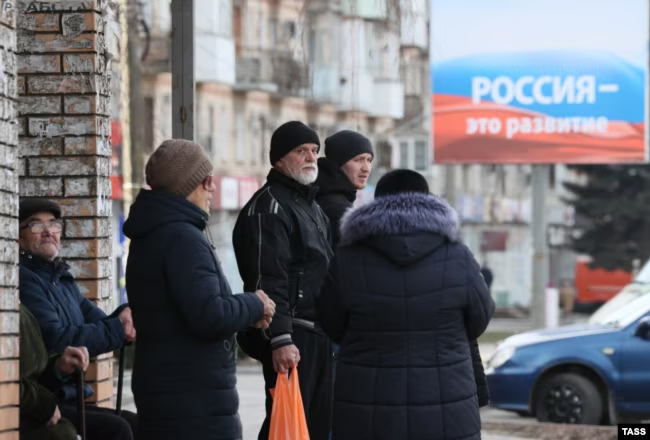
The occupied city of Melitopol, February 13, 2023
Secrecy of “election” and demonization of Ukraine
Compared to 2023 local pseudo-elections, the current “election campaign” is conducted in a more secretive manner and in the atmosphere of constant threat from Ukraine.
Statistical data on the number of voters in the occupied areas of Donetsk, Luhansk, Kherson and Zaporizhzhia oblasts were classified as confidential on the website of the Central Election Commission of the Russian Federation (CEC).
However, members of the CEC of Russia have made public statements saying that almost 6 million voters are registered in the “new territorial subjects of the Russian Federation”. In particular:
- 1 million 971 thousand voters – in the “DPR”,
- 1 million 652 thousand voters – in the “LPR”,
- 470 thousand voters – in Zaporizhzhia oblast,
- 468 thousand voters – in Kherson oblast.
- 1 million 478 thousand voters in the occupied Crimea
These are inflated figures that don’t correspond to reality.
Today, it is difficult to estimate the actual number of Ukrainians that remain in the temporarily occupied territories.
According to advisor to the mayor of Mariupol Petro Andryushchenko, about 90,000 people lived in Mariupol as of May 2023.
350 thousand residents either left the city or died.
According to journalist Natalia Dyedova, who is the wife of Viktor Dyedov who died in Mariupol in March 2022, the city authorities knew for a fact that, as of August 2022, there were 87,000 casualties among local residents who carried a passport or some other ID at the time of their death.
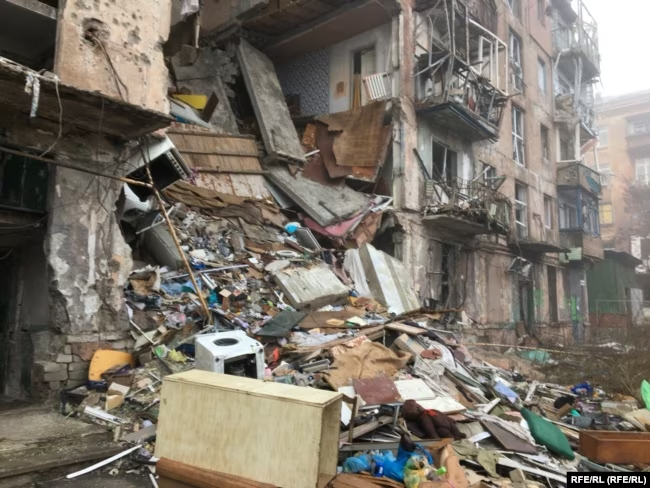
The city of Mariupol destroyed and occupied by Russia. January 2023
It should also be noted that the local population of the occupied Ukrainian cities is being replaced by Russians on a systematic basis.
For example, by 2035, the occupation authorities plan to relocate about 300,000 immigrants from the Russian Federation to Mariupol to facilitate colonization of the occupied territories and “dilute” the local population.
According to UN, there are about 1.252 million Ukrainians in Russia and Belarus, some of whom were transferred by force from the occupied territories.
During the conduct of “local elections” in the TOTs in September 2023, Russian authorities kept the lid on information about the members of election commissions, and in the “2024 presidential election” they even concealed the addresses of polling stations.
As explained by Russian propaganda, this information is kept confidential because Ukraine is allegedly planning to intimidate and “kill” the members of “election commissions” as well as ordinary voters. Such statements represent an example of systematic demonization of Ukraine with the aim of strengthening ideological argumentation of “special military operation”.
Meanwhile, the residents of border areas of Belgorod, Kursk and Bryansk oblasts of the Russian Federation are allowed to vote at home – the so-called “voting on tree stumps” – despite the declaration of martial law in these regions, which further undermines the security and transparency of the electoral process.
At the same time, Russian propaganda speculates on the impossibility of holding parliamentary and presidential elections in Ukraine. “Expression of the will of the people” in the Russian Federation is presented as proof of legitimacy of the Kremlin regime – in contrast with the absence of legitimate government in Ukraine.
Furthermore, Russian presidential candidates are using the topic of postponement of elections in Ukraine for campaigning purposes: candidate Leonid Slutsky representing the Liberal Democratic Party has repeatedly claimed that the conduct of “2024 presidential election” goes to prove that Russia is a genuine democracy while Ukraine is ruled by a dictator.
Russian propagandists and some Ukrainian media outlets also promote this narrative in the information space of Ukraine. Such messages are part of Russian disinformation campaign aimed at undermining the international support for Ukraine. They fall in line with the established tradition of non-recognition of Ukrainian government – the narrative about “2014 coup d’état”.
Flagrant violation of international law
The 2024 presidential “election” stands in direct contradiction to Ukrainian and international laws and shall be considered null and void, just like the 2014 and 2022 pseudo-referendums as well as the 2023 local pseudo-elections.
On February 24, 2024, leaders of G7 countries stated that they would never recognize the results of elections in the occupied territories. In its turn, Ukraine emphasizes the fictitious nature of political processes in Russia and calls on the international community to reject the results of pseudo-election not only in the TOTs but also in the Russian Federation as a whole.
Back in July 2023 (in the run-up to local “elections” in the TOT), the CEC of Ukraine published a resolution “On the illegitimacy of the intentions of the Russian Federation to organize, prepare and hold any sort of election in the temporarily occupied territories of Ukraine”, stating that Russia has no right to hold elections in the occupied territories, and all actions aimed at violating the territorial integrity of Ukraine shall be deemed illegal.
Another problem facing Ukraine is that our international partners still recognize Vladimir Putin as legitimate President of the Russian Federation despite systematic crackdown on freedom of speech and expression and the fact that Russian “elections” contradict the principles of democracy, transparency and true competitiveness. All of the aforesaid goes to show that the world community has a very limited set of tools when it comes to responding to Russia’s violations of international law.
The absence of genuine political processes and the non-competitive nature of elections in Russia were on full display during the registration of presidential candidates. The purpose of imitating political competition is to prolong the term of legitimacy of Putin’s regime until 2030 at the very least.
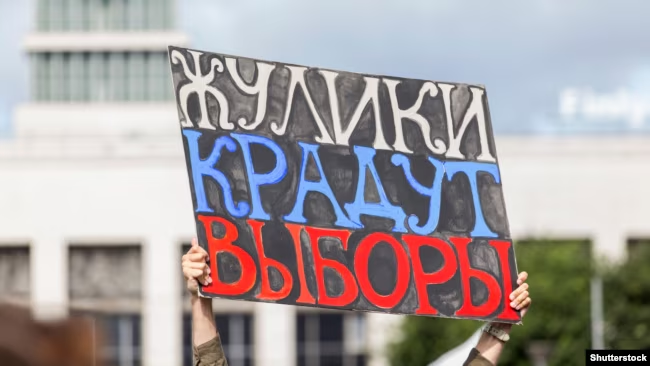
Street protest in St. Petersburg (archive photo)
The absence of genuine political processes is also evidenced by the fact that even those Russian politicians that were allowed to run for presidency do not propose fundamentally new paths of development of the Russian Federation nor do they pose a real challenge to Putin.
For example, the leader of the Liberal Democratic Party Leonid Slutsky expressly declared that he doesn’t plan to win the election, while Vladislav Davankov (“New People” party) and Nikolay Kharitonov (Communist Party) said that they will refrain from criticizing Putin and his decisions. All registered candidates stated the necessity of concluding “peace” on Russia’s terms, which include the surrender of Ukraine, disarmament of the Ukrainian army, and official recognition of annexed territories.
Russian media don’t discuss the election programs of candidates nor do they provide coverage of the course of election campaign. The only intrigue is who will be allowed to take second place.
The 2024 presidential “election” is held under conditions of increasing diplomatic isolation of the Russian Federation, which is evident in the fact that Russia has reduced the number of polling stations in “unfriendly countries” and makes attempts to discredit independent international organizations that conduct election monitoring.
Russia has made unfounded claims about Latvia’s plan to prosecute those Russian expats who will take part in voting in March 2024. On January 30, the Russian Foreign Ministry stated that the OSCE experts weren’t invited to observe the presidential election because they work for “overly politicized anti-Russian organization”. Furthermore, the head of the Russian CEC claimed that “the CIA and MI6 are recruiting Russian citizens all over the world with the aim of disrupting the presidential election in the Russian Federation”.
At the same time, Russia has sent invitations to “puppet” observers from “friendly countries” to create an illusion of a fair and transparent electoral process. Representatives of 95 countries, including Venezuela, members of the CIS organizations and the CEC of Belarus have already announced that they will take part in election monitoring.
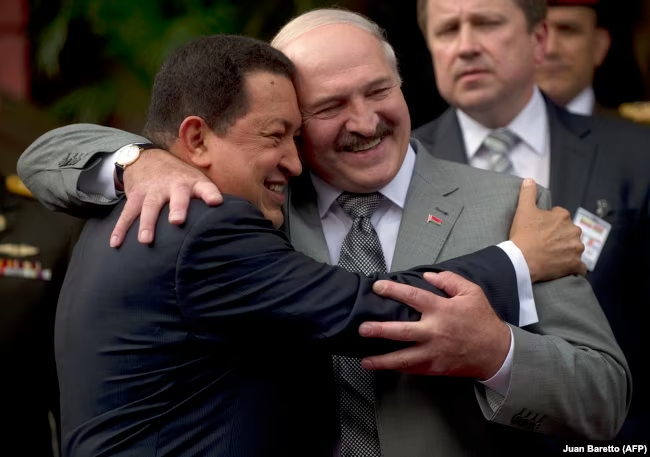
Venezuelan President Maduro and Belarusian President Lukashenko. Caracas, 2012
It is worth noting that the members of far-right and far-left European parties that oppose the EU’s Russia policy will also come to the Russian Federation in private capacity, despite the fact that the EU and G7 representatives were banned from monitoring the presidential election (since they are “unfriendly” to Russia).
The representatives of Fidesz (Hungary), Alternative for Germany and different NGOs that promote cooperation with Russia in politics and cultural sphere were among those who participated in Russian election observation in previous years. As a rule, they cooperate through the agency of “Rossotrudnichestvo”, which is one of Russia’s most powerful tools for exerting influence in foreign countries.
These “observers” not only act as accomplices to criminal “election” but also form a network of Russian agents that exert influence in the West. Ukraine calls on foreign governments and international organizations to refrain from sending their observers to monitor the “elections” in Russia, which helps Russian propaganda promote the narrative about the “legitimacy” of elections and political processes in Russia.
The pre-determined election results, the absence of genuine political process in Russia, and the use of repressive measures with the aim of increasing the turnout of voters in the occupied territories go to show that Russia is imitating the democratic election process. The so-called “presidential election” serves the purpose of legitimization of Putin’s regime, justification of continuation of the war against Ukraine, denial of Ukrainian statehood, and intensification of “integration” of the TOTs into the Russian Federation.
Kateryna Mikhalevska, junior analyst of Civil Network OPORA, specially for Radio Svoboda
